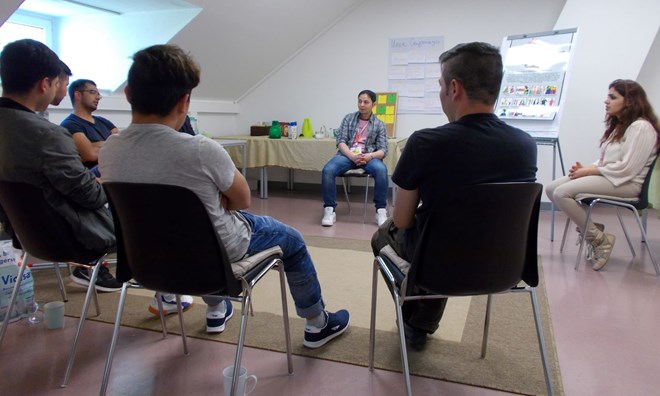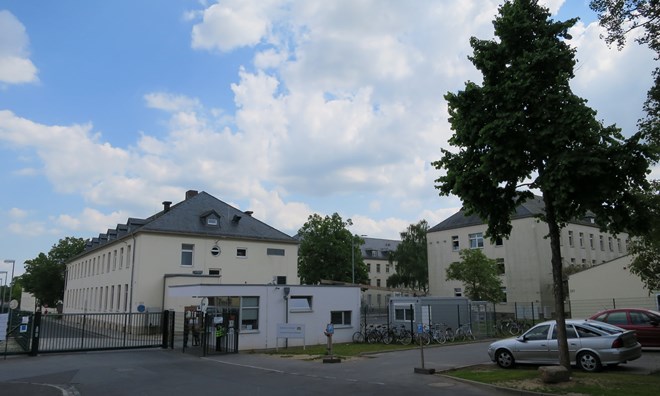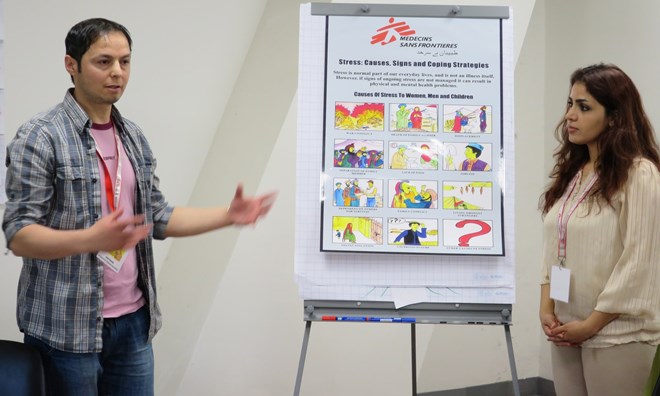
Thursday August 31, 2017

The group therapy session led by a psychosocial peer counsellor in Schweinfurt, part of an MSF pilot project to provide mental health services to new arrivals in Germany. Photograph: MSF
On the top floor of a former US army barracks in Schweinfurt, Germany, a Somali refugee called Abdi Mohamed is standing in front of a colourful chart which says: “Stress: Causes, Signs and Coping Strategies”.
Mohamed is running a small group therapy session, together with Parisa Moayedi, a colleague from Iran. “What do you feel when you get stressed?” Mohamed asks two recently arrived asylum seekers from Somalia.
This building housed US servicemen during the cold war. It has been converted into a medical centre with green tile floors and examination rooms for the paediatricians and doctors in charge of screening newly arrived asylum seekers. A sign posted outside lists the distances back to where some of the people milling around the base began their journeys to Germany: Kabul, 5,007km; Damascus, 2,815; Kiev, 1,445.
Quietly, a tall, thin young man says he forgets important appointments and loses his appetite. Next to him, another young Somali wearing a pressed button-down shirt and dark jeans says he gets headaches and has trouble concentrating. “That’s good to recognise,” Mohamed says encouragingly. “Can you think of some things you can do to make yourself feel better?”
The session is part of the first mission Médecins Sans Frontières (MSF) has ever launched within Germany. A pilot project to train refugees as psychosocial peer counsellors, the goal is to teach coping skills and stress management while giving new arrivals someone to talk to about their troubles.
Officially launched in March in cooperation with a local hospital in Schweinfurt, the project is one of a small but growing number of programmes aimed at addressing the near-total lack of mental health services for the hundreds of thousands of refugees and asylum seekers who have arrived in Germany since 2015.
When the German chancellor, Angela Merkel, gave her “we can do it” speech two years ago, MSF quickly realised there was a huge gap in mental health care - even in wealthy Germany.
Many newly arrived refugees suffer from post-traumatic stress disorder; a 2015 estimate by Germany’s largest association of psychotherapists indicated up to 40% of refugees had symptoms of depression or anxiety related to the situation back home or their difficult journeys.
Left untreated, such disorders can be crippling, costly and potentially dangerous. Several recent attacks in Germany allegedly involved asylum seekers or refugees with untreated mental health problems.
Germany’s mental health care system was strained even before the arrival of hundreds of thousands of migrants from Syria and elsewhere in 2015. “The German system is totally overwhelmed,” says MSF clinical psychologist Ulrike Zellmann. “When it comes to prevention and help, there’s almost nothing.”
And even if there were enough trained German counsellors to handle the thousands of new arrivals suffering from trauma and depression, language and cultural barriers often conspire to keep refugees from accessing mental health care.
German health insurance does not pay for translation services, and many asylum seekers are not even aware that counselling is an option. “In Somalia, there’s no mental health care system, and people often have no idea there’s anyone you can turn to outside family,” says Mohamed. “It’s unbelievably reassuring to talk to someone in their language from their country.”

The refugee reception facility in Schweinfurt. Photograph: MSF
Zellmann says refugees working as psychosocial peer counsellors are poised to play a vital role. Trained counsellors fluent in Arabic, Somali and other languages – and familiar with the culture and situations refugees are coming from – can give people the skills to manage stress and anxiety themselves, before their symptoms get worse.
“They had good reasons to leave their homelands, there were difficult experiences on their journey, and being in Germany isn’t easy either,” Zellmann says. “We don’t want to wait until they ask for help.”
Zellmann modelled the Schweinfurt project on a similar counselling programme she ran at an MSF camp for displaced Syrians in northern Iraq. The pilot project’s counsellors – Mohamed, a former radio journalist from Mogadishu who arrived in Germany in 2011; Moayedi, a trained social worker from Iran who works with the shelter’s many Farsi-speaking Afghan refugees; and a former English teacher from Aleppo, Syria – went through months of classroom training before seeing their first clients.
The counsellors are employed by the local hospital and supervised by trained psychiatrists. An important part of their training is immediately recognising tougher cases – people who are considering suicide, for example – and referring them to doctors. They then accompany patients to translate and explain what is happening.
To reach as many people as possible, a one-on-one session is part of the standard intake procedure, like a medical checkup. The sessions are held in a bright, airy room on the second floor of Barrack 209. Boxes of tissues sit atop a low coffee table made of repurposed pallets. In the corner, there’s a small easel and a plastic stegosaurus toy to put children at ease.
The meetings are low-key: the peer counsellors introduce themselves and ask new arrivals about themselves, their worries and their journeys.
Group therapy sessions are also an important part of the programme. It’s often hard for people to talk about problems in front of strangers, but seeing other people with the same concerns is a huge help. Zellmann observes as Mohamed concludes the group therapy session by asking the men to close their eyes and listen to their heartbeat for three minutes. It’s a standard mindfulness exercise, he explains, one the men can do on their own when they feel overwhelmed.
As the minutes tick by, the sound of birdsong and muffled traffic fills the room. The men visibly relax and smile for the first time in the 90-minute session. “When they’re alone and can’t sleep and have nightmares, people start to think they’re crazy and weird and don’t want to talk with their family. That’s where problems really start,” Zellmann says as the men leave, chatting with one another. “It’s good to know there are others in the same situation. That’s why education is so important.”

The Stress: Causes, Signs and Coping Strategies chart used in the group therapy session. Photograph: MSF